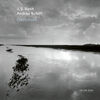Donizetti: Lucie De Lammermoor (Lucia Di Lammermoor) (1893 French Version)
Patrizia Ciofi
Opera - Released January 1, 1998 | Dynamic
Maurice Yvain: Yes!
Les Frivolités Parisiennes
Classical - Released March 22, 2024 | Alpha Classics
Donizetti : Lucia di Lammermoor (Remastered)
Georges Prêtre
Classical - Released January 1, 1966 | RCA Red Seal
Psyché
Christophe Rousset
Classical - Released January 13, 2023 | Château de Versailles Spectacles
Rachmaninoff: The Piano Concertos & Paganini Rhapsody
Yuja Wang
Classical - Released September 1, 2023 | Deutsche Grammophon (DG)
Atys
Christophe Rousset
Opera - Released January 5, 2024 | Château de Versailles Spectacles
Essence
Marina Rebeka
Opera - Released November 24, 2023 | Prima Classic
Telemann: Fantasias for Solo Violin
Alina Ibragimova
Classical - Released October 7, 2022 | Hyperion
Felix Mendelssohn: The Complete String Symphonies
Munich Radio Orchestra
Classical - Released June 4, 2021 | BR-Klassik
Haydn 2032, Vol. 1: La Passione
Giovanni Antonini
Classical - Released October 7, 2014 | Alpha Classics
Elisabeth Jacquet de la Guerre: Céphale et Procris
Reinoud Van Mechelen
Classical - Released February 9, 2024 | Château de Versailles Spectacles
J.S. Bach: Clavichord
András Schiff
Solo Piano - Released January 27, 2023 | ECM New Series
Donizetti: Lucia di Lammermoor
Luciano Pavarotti
Classical - Released January 1, 1972 | Decca Music Group Ltd.
Poulenc: La voix humaine
Véronique Gens
Classical - Released January 13, 2023 | Alpha Classics
Donizetti: Lucia di Lammermoor (1955 - Berlin) - Callas Live Remastered
Maria Callas
Opera - Released September 15, 2017 | Warner Classics
Mendelssohn: Complete Works for Piano Solo
Ana-Marija Markovina
Classical - Released January 7, 2022 | haenssler CLASSIC
Gaetano Donizetti : Lucia di Lammermoor (1959) - Callas Remastered
Maria Callas
Opera - Released September 19, 2014 | Warner Classics
Kaija Saariaho: L'Amour de loin
Kent Nagano
Classical - Released July 27, 2009 | harmonia mundi
Bizet: Carmen, WD 31
Herbert von Karajan
Classical - Released January 1, 1964 | Sony Classical
Caprice
Nathanaël Gouin
Classical - Released October 13, 2023 | Mirare






















 Suppose you have a more precise idea of what you want. If you are searching for the album "Bad" by Michael Jackson, type michael jackson bad. The album in question will be displayed at the top, as it is the most relevant.
Suppose you have a more precise idea of what you want. If you are searching for the album "Bad" by Michael Jackson, type michael jackson bad. The album in question will be displayed at the top, as it is the most relevant.
 By default, search results are sorted in order of relevance. The drop-down menu to the right of "Sort by" allows you to display the results in the desired order.
By default, search results are sorted in order of relevance. The drop-down menu to the right of "Sort by" allows you to display the results in the desired order.